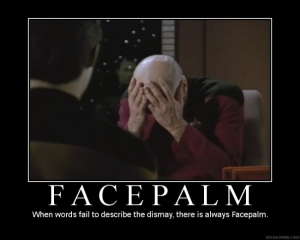Hindsight bias is our tendency to overestimate the obviousness of events… once they’ve already occurred.
“I knew it!” is a common utterance at the poker table. I hear it all the time. Often it will be right after someone calls a big bet on the river but loses the pot.
No. You didn’t know it. The fact that you are upset and surprised by seeing the winning hand makes it obvious you did not know the outcome in advance. Why did you call the bet if you knew you would lose? It doesn’t even make sense. So why do people actually believe themselves when they say things like this?
First, let’s recall the main reason why poker is such good rationality training. It’s the breakneck speed and frequency with which poker demands important decisions. It’s an amplified microcosm for real life. It’s a complete pressure cooker for your mind. Whatever bias is causing you to fail in poker, it’s the same bias causing you to fail in real life too. In real life though, things move much slower. You may only encounter this failure mode of yours rarely and under high-pressure, important situations — which is unfortunate because this is precisely the time when you can least afford to have your mind fail you. Even worse, it happens so infrequently that this small amount of “real world” feedback will rarely give you a chance to learn from your mistakes. Wouldn’t you like to be prepared for important life situations by training to avoid biases under pressure in a less important arena beforehand? That’s what poker is for. It gives you a place to find your failure mode and learn to overcome it by simply striving to become a winning player in poker.
The trick is you have to approach the game of poker looking for your failure mode. People who don’t approach poker with this mindset just repeat their failures over and over again without ever learning. So that’s why I’m telling you about all these biases that routinely come up in poker. Not so you can avoid them all, every time. No. You need to know what they look like before they arrive so that you have a chance to notice them because they are bound to occur. Remember, your biases won’t say “Hey, I’m ruining your thinking and clouding your good judgement.” It will just look like the normal kind of cognition you are used to. These descriptions are meant to give you clues so you can pinpoint your failure mode when it arises.
So the good news is that poker can uncover your failure mode and amplify it to the point that it should be possible to spot it if you’re looking for it. So what about hindsight bias? Lying to ourselves and saying that we knew the outcome of a hand all along serves the same purpose as self-serving bias: it seeks to limit our immediate emotional loss in a moment of pain and embarrassment. It salvages a small portion of our pride by trying to “prove us right”; clinging to a delusional shred of dignity in an otherwise total defeat. But it robs us of a golden opportunity to acknowledge our mistake. If we can’t acknowledge that we’re making a mistake, we can’t hope to learn from that mistake either.
If you’ve played poker and done this yourself, don’t feel bad though. Even top professional are notorious for claiming to have known they were beat once the cards were turned over. [Although I’d guess most of them don’t realize that this is a total failure of rationality.] So my final warning to you is that if you ever find yourself playing poker and you say out loud or to yourself, “I knew it!”, when you see a hand, the first step is not to ignore it! If you learn about this bias incorrectly, you can learn a dangerous lesson here. If you’re ashamed to be biased yourself, you’ll likely ignore it when it comes up! This is a whole ‘nother level of self-serving bias! Make sure you don’t go there. Never be embarrassed that you exhibited a bias. It’s good news! You just discovered something you can learn from and improve! Notice how your body feels and what’s going through your mind when you’re exhibiting bias. These associations will help you recognize it more easily the next time it occurs so you can properly navigate the situation without succumbing to it in the future. Remember to have vigilance and as many levels of self-reflection and analysis for your game as you can handle.
Quick exercise: When do you exhibit hindsight bias outside of poker? Do you ever consistently claim to have known how some event would turn out only after knowing the outcome? Can you think of outcomes you feel certain you predicted in advance but couldn’t imagine yourself betting $100 given the information you had before the outcome was revealed? Do you ever do this in situations where it’s obvious that if you really knew the outcomes in advance, you would avoid these situations all together? Post in the comments so we can look for places outside of poker to be vigilant for hindsight bias.


I think lots of people, myself included, go through many possibilities when they are faced with a tough decision: “Well, he could have this…or that…or may be this…unlikely that…” So then they make the decision and the outcome is revealed, and they say “Oh, I knew that.” What they actually mean is “Oh, I accounted for that in my mind, I knew it was a possibility.” Which is technically right, but they forget to account for the weighted probability. Yes all the options were possible, but which one was more likely? Which one would you bet on? Which one _did_ you bet on?